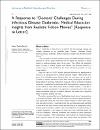A response to “doctors' challenges during infectious disease outbreaks: Medical education insights from realistic fiction movies” [response to letter]
Abstract
First, I would like to thank Choi et al (2021)6 for their thorough reading and valuable comments on my published paper “Doctors’ Challenges During Infectious Disease Outbreaks: Medical Education Insights from Realistic Fiction Movies.”1
I was very glad to see their comment saying “The selfless qualities of doctors portrayed in movies played important roles to inspire the decisions to pursue careers in medicine amongst many of our peers.” This reflects the humanistic aspect of being a medical student, and indicates that choosing medicine as a future career is motivated first by the ethical and human principles of many young students.
Ning Yan Choi et al (2021) actually perceived brilliantly my appreciation of movies as an educational tool in medical education. Indeed, I believe that every genre of art including cinema, literature, fine arts, and music, can be used as a medium in medical education to teach about social, psychological, and philosophical aspects of doctoring. Furthermore, using art works as a medium in medical studies has a contribution for professional skills. Past studies have suggested that art can be utilized to teach observational skills in medical students, a skill that is integral to patient examination.2 It is important to mention here that while many studies recommend using art in medical education, the studies on its long-term impact on medical students are scarce.
Collections
- Medicine Research [1892 items ]


